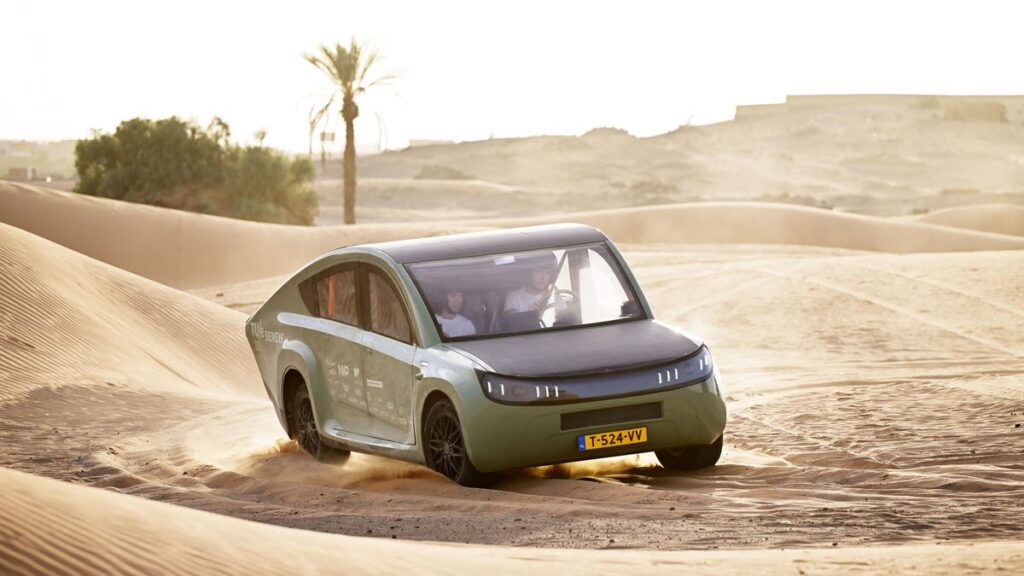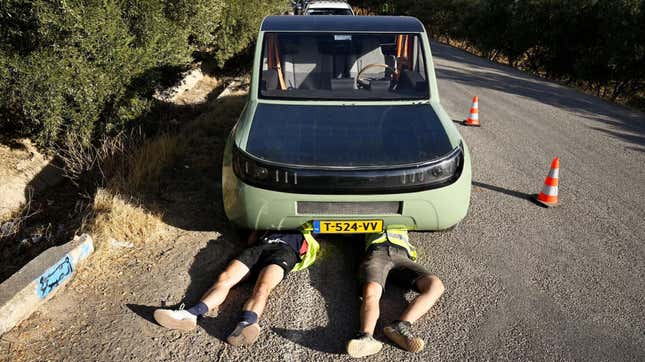Solar-Powered Car Drives Across Morocco To The Sahara Without Using Charging Stations

A solar-powered car made by students in the Netherlands completed a 1,000- kilometer (621-mile) journey through some of the toughest terrain EVs have faced so far, let alone EVs powered by nothing but the sun. The Stella Terra went from the northern coast of Morocco to the Sahara Desert without stopping at a charging station even once, relying instead on highly-efficient solar panels.
The 2024 Acura Integra Type S Transmission Will Make A Believer Out Of You
Fully electric cars have mostly been unable to undertake similar journeys in remote locations that lack EV infrastructure, but the Stella Terra has no need for charging stations. And the Terra’s custom solar panels are so efficient, they even surprised the team of students who designed and made EV from scratch.
Photo: STE / Bart van Overbeeke
The students are from the Eindhoven University of Technology, which hosts Solar Team Eindhoven, as the group is collectively known. They report that the Stella Terra turned out to be about 33 percent more efficient than expected, achieving a range of at least 710 kilometers (441 miles) on a sunny day and an estimated 660 kilometers (410 miles) when it’s cloudy.
Those figures reflect the Terra’s range when driven on paved roads, but the solar-powered EV is unique for having been designed as an off-road EV, which is capable of tackling a number of different terrains. Depending on the surfaces, the Terra’s off-road range drops to around 550 kilometers (342 miles) when the weather is favorable, per CNN.
That’s still an impressive amount and a testament to the students’ work, which required designs that exceed everything on today’s market. Team manager Wisse Bos says the technology on the Terra is up to a decade ahead of anything else that’s currently for sale. The Terra’s custom-made converter was found to be 97 percent efficient in turning sunlight harvested by the roof-fitted solar panels into electricity, according to the Guardian.

Photo: STE / Bart van Overbeeke

Photo: STE / Bart van Overbeeke
Most solar panels and converters commonly available today are about 15 to 20 percent efficient, and the best panels on the market go as high as 45 percent. That means the system on the Stella Terra is over twice as efficient at turning sunlight into electricity as anything else that’s currently for sale.
But the remarkable efforts on the students’ behalf weren’t only focused on the solar system’s efficiency. Since this is an off-road EV, the students had to make sure it wouldn’t be too heavy. They managed to make a lightweight vehicle that tips the scales at 1,200 kilograms (2,646 pounds), which is a radical departure from commercially available EVs. The battery is charged as the car is driven, so it doesn’t have to be very big or heavy, which is a problem most EVs have.
The Terra is a featherweight among EVs and therefore pretty capable off-road thanks to the use of a smaller battery and lightweight components. That doesn’t mean the Terra is without amenities such as fully reclinable seats that can be used as a bed while the car is on multi-day journeys. The Terra can also share its generous charging capabilities, and it will juice up phones and cameras.
Of course, a test drive through Morocco and onto the Sahara wouldn’t be complete without a pit stop, and the Stella Terra did require a mid-journey repair to its steering system. The students were able to fix the Terra and get it back to its on- and off-road journey at a local shop. In the end, repairs were necessary but a stop at a charging station was not.

Photo: STE / Bart van Overbeeke



